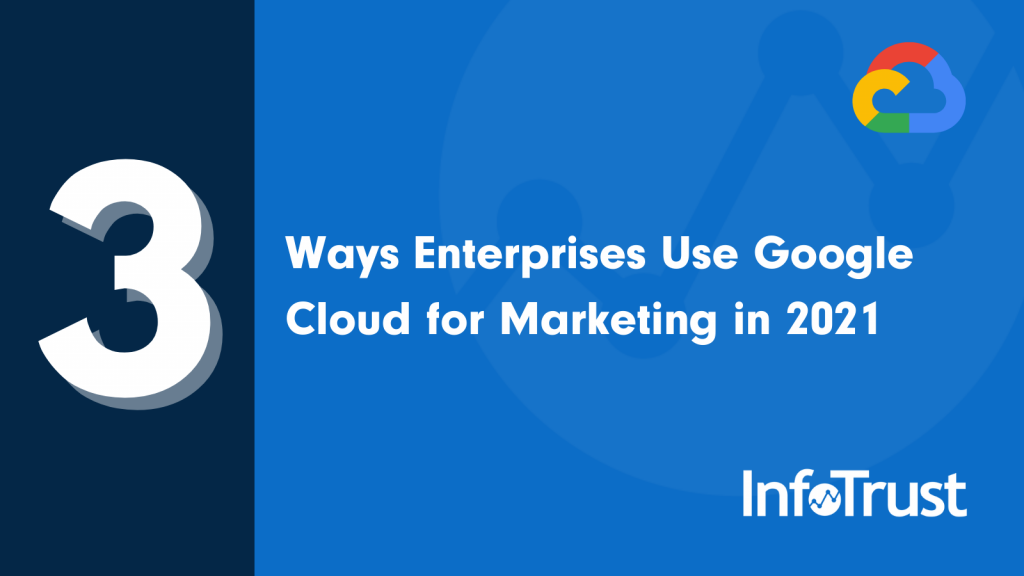As a data scientist with InfoTrust, my team and I have the opportunity to work with marketers from some of the largest organizations in the world. We are fortunate to have a privileged view of how digital analytics and marketing are evolving, and we wanted to share the changes that we expect to see in 2021 as enterprises lean more heavily into using Google Cloud Platform (GCP) for marketing.
Here are three ways that enterprises are using GCP for marketing in 2021:
Standardized Reporting and Dashboarding
For many of our partners, cloud migration projects are ongoing. Whether they are using GCP as a data lake to store large quantities of (usually) unstructured data, or as a data warehouse to store a curated selection of highly transformed and structured data, many enterprises have already completed these foundational steps to get their data into the cloud. Now that this work is complete, they are standardizing their reporting and dashboards across the entire organization.
We’ve seen some patterns over time. First, significant effort is dedicated to determining the source of truth for each set of metrics and curating how those metrics are reported.
For example, there are multiple ways that a marketer can pull e-commerce revenue data: through Google Analytics, their order management system, or their finance team’s reports. Because these systems work differently and have various levels of accuracy, reports don’t match. Although this lack of consistency is expected and predictable, it frequently causes confusion and friction for internal teams. To combat this issue, we’ve seen our enterprise partners heavily curate data in reports so that all teams are referencing the same data. Each data source has its benefits and limitations so it’s essential to clearly communicate what data is being used and why.
Second, we’ve seen an increase in demand for standardized dashboards, in addition to standardized reporting.
Dashboards provide the extra benefits of being self-service and interactive. This facilitates rapid discovery and ad hoc analysis. Furthermore, we’ve seen many teams push for real-time (or at least faster) reporting because marketers and channel managers closely monitor the performance of their campaigns and adjust their strategies accordingly. Self-service, automatically-updating dashboards are a natural choice in this fast-moving environment.
Third, our enterprise partners are investing in enterprise-level visualization tools.
Looker, Tableau, and Power BI are popular choices because they have the flexibility to accommodate large quantities of data, complex data models, and frequent data updates. Availability and latency are often the two biggest requirements of a visualization tool. If the tool can’t provide the data when it’s needed, or can’t display it quickly enough, adoption of the dashboards within the organization will be an uphill battle.
InfoTrust recently earned Looker partner certification in an effort to better serve its analytics clients.
Machine Learning (ML)
There have been several enhancements and additions to the ML capabilities within GCP, making advanced modeling accessible to many more organizations.
For experienced teams that are looking for an end-to-end solution, AI Platform is the top choice. Analysts can train their models in Notebooks, a Jupyter Notebooks service, which comes pre-installed with deep learning frameworks and libraries. Also, the recent addition of the new unified AI Platform brings in the capabilities of AutoML and MLOps. Our partners use Notebooks for fitting custom propensity or lifetime value models, or by leveraging the pre-built image classification, object detection, and natural language models in AutoML.
For organizations that are just getting started with machine learning, BigQuery ML (BQ ML) is a strong option. Although BQ ML was released in 2018 with only a few select model types, Google added more capabilities in 2020. In addition to linear models, BQ ML now supports matrix factorization models (used for recommendation engines), boosted trees (regression and classification), deep neural networks (regression and classification), and time series models (used for forecasting).
The key benefit of BQ ML is that you can build models directly from BigQuery. Analysts familiar with SQL can fit sophisticated models without needing to write scripts or migrate the data to powerful virtual machines. Many enterprises already store their analytics data in BigQuery, so BQ ML is a natural choice for marketers interested in building their own models using their GA data.
Regardless of platform, we see an increased emphasis on how to better use data to drive marketing outcomes. The ML capabilities in GCP provide opportunities for improving audience, campaign, and overall marketing strategies.
Preparing for the Transition to Google Analytics 4 (GA4)
Google has announced that GA4 is the future of analytics—and enterprises are proactively planning for the transition to GA4’s new tracking and data model. Many of our enterprise partners currently take advantage of the integration between Google Analytics 360 and GCP, which exports their complete, hit-level data from GA into BigQuery.
For marketers already analyzing analytics data in BigQuery, the switch to GA4 will have a major impact on the way they derive insights from the data. The new data model is event-based. Therefore, familiar metrics such as pageviews and sessions will be calculated and queried differently. To ease the transition, we recommend dual-tagging on websites and apps so that data is collected under both models. That way, marketers and analysts have time to adjust to the new data model and transition their queries to the new schema.
So far, 2021 has been an exciting year for exploring the enhanced capabilities of GCP for marketing. Although the landscape of analytics continues to evolve, we see our enterprise partners investing in these three areas to drive efficiencies, innovation, and set themselves up for success in the future.


